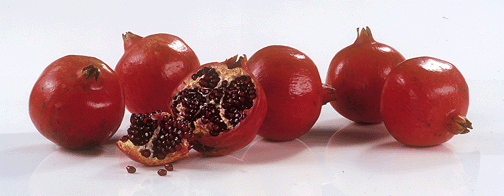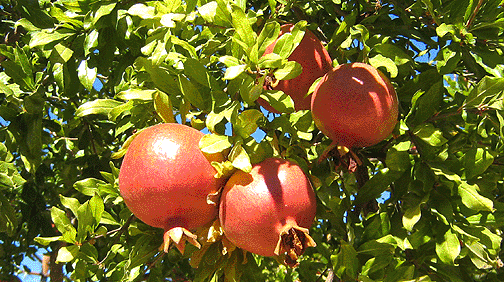|
Folklore
Pomegranate is an ancient food, symbolic of abundance and generosity.
Believed to be native to Persia (Iran) and neighbouring lands, the
Punica granatum tree was part of the Mediterranean landscape in
the distant past. Cultivation spread through the Arabian Peninsula,
progressed to Afghanistan and India, and the pomegranate rose to
prominence and was welcome all over the Orient.
Long
before, prophet Mohammed praised this ancient fruit, and recommended,
"Eat pomegranate, for it cleanses the body of hatred and envy."
Jews and Persians held the pomegranate in high regard as the forbidden
fruit of the tree of knowledge of good and evil mentioned in the
Bible. The word pomegranate is derived from middle French "pome
garnete' and literally means 'seeded apple."
Luckily,
humans were not denied temptation of the pomegranate, and even the
legendary King Soloman owned an orchard of the precious fruit. Ancient
Egyptians had a taste for the pomegranate, which they consumed fresh
or pressed out to obtain a refreshing beverage. And according to
Biblical account, after the flight from Egypt, the Israelites yearned
for the cooling pomegranate juice during their wandering.
India was introduced to a number of culinary innovations by Arabs
and Persians, and owes the presence of pomegranate and sesame seeds
in certain dishes to these influences. The Chinese valued it as
one of the three blessed fruits of Buddha. Chinese women offer it
to their goddess of mercy when praying for children. In Turkey a
bride would throw a pomegranate on the floor to ascertain the number
of children from the number of seeds scattered. The Greeks regarded
the pomegranate as the symbol of love and fertility, as the fruit
was believed to have sprung from the blood of Dionysus - a spring
fertility god. To the Romans it was the "apple of Carthage."
In Persia, the pomegranate was a popular amulet against evils.
In one of the earliest Homeric Hymns there is an interesting reference
to Pomegranate. Pluto, the king of the dead souls had abducted Persephone
and took her as a bride to his underworld kingdom. Persephone's
mother, Demeter was the goddess of harvest and in grief she rendered
the earth barren. She would not allow the earth to bear fruit until
she had seen her only daughter. Finally Zeus urged his underworld
brother to return Persephone. Pluto had to relent but he made his
wife eat a pomegranate seed, knowing that if she did, she must return
to him. Demeter was happy to see her daughter but grieved to learn
about the pomegranate seed, fearing that she could not keep her
daughter with her. There on, Persephone spent four months with her
mother and returned to the world of the dead for the remaining part
of the year. Ancient Greeks associated pomegranate with the dead
as its color resembled blood and they believed that the dead needed
blood for their strength. For this reason, ancient Greek tombs bear
the symbol of this forbidden fruit.
The
Byzantine emperor Justinian (483-565), who shared his throne with
the beautiful Theodore, a notorious second generation Cypriot harlot,
was fond of pomegranate juice. And alongside Chilled Chaos wine,
snow chilled pomegranate juice flowed at the imperial banquets prepared
by Theodore's chef under her supervision. The chef, who hailed from
India, had a penchant for creating exciting menus for which he found
inspiration in the cuisines of Persia, Greece and India. And Theodore
entertained lavishly and with brilliant results, for she was a proud
advocate of high gastronomy.
The
delights of the pomegranate have been extolled by writers and poets,
past and present. Even Oscar Wilde (1856-1900), the wit and playwright,
compares, "As a pomegranate cut in twain; white-seeded is her
crimson mouth." On a similarly lyrical note, cooks and epicures
have assigned a special place to the pomegranate. For though the
fruit is not popularly regarded as a versatile cooking ingredient,
it offers a wide range of tempting possibilities. In fact, the pomegranate
is full of wonders. It may be used as flavoring, sauce, marinade,
in cakes or pudding, or simply as a garnish. And the crimson seeds
or their juice will swiftly transform a humble dish into an exotic
specialty. Used lavishly in Lebanese cuisine, its juice concentrate
imparts a tangy flavor to meatballs, stuffed fish, and chicken.

Handling
Tips
Choosing a pomegranate should not be difficult. Prefer a larger
one ( as they are juicier) with a healthy skin which should be thin,
tough and unbroken. A simple way of separating the seeds is to cut
the crown and lightly cut the rind at sections. Immerse it in water
for five minutes and break the sections under water which will allow
the seeds to settle at the bottom while the pithy skin and the membrane
will float.
You
must, however, handle the pomegranate with care. The color is fast-no
pun intended and will stain, probably forever, whatever it touches.
Also, never cut a pomegranate with steel or any other metal knife,
because the juice will acquire a bitter taste. But don't feel discouraged.
Plastic or wooden juicers are available, as are plastic or wooden
knives, forks and spoons. The juice is delicious, and worth the
effort of special attention.
No
matter how you decide to use this ruddy red fruit, keep in mind
that it is permissible to pluck out the seeds with your fingers,
just as the ancients did. Messy ? A little, but there is consolation
in the old saying that fingers were invented before forks. Try it,
anyway. And you can also make a small hole in the fruit, squeeze
out the juice, and let it flow into your mouth. Then you will know
why the pomegranate is seemingly immortal.
Other
Related Articles in Handling Pomegranat:e:
How
to Cut Open a Pomegranate
Homeopathic
Applications
Pomegranates are classified as sweet, sour and sweet-sour. They
are highly nutritious and contain energy giving proteins, lime,
iron and phosphorus. Sour and sweet-sour pomegranates are very effective
in relieving gastric heat and are particularly recommended for people
with a bilious nature. Most of the stomach complaints respond positively
to sour and sweet but fresh pomegranates sprinkled with salt and
pepper are the best. Pomegranate juice is a sure cure for diarrhea.
If blood passes with stool in diarrhea, this too will be stopped
by the use of fresh pomegranate juice.
Complaints of chest pain and chronic cough find immediate relief
with the administration of pomegranate that has been treated with
almond oil. Having selected a proper pomegranate, drill a hole on
the top and add pure almond oil. The fruit is then cooked on a low
flame, preferably charcoal until the oil is fully absorbed. Sucking
of such seeds eases chest troubles.
Women
complaining of regular miscarriage may try fresh pomegranate flowers
by crushing them in water and adding sugar to it. The syrup is strained
and taken on an empty stomach for three consecutive days. The bark
of the root of the pomegranate tree has a powerful germicidal action
on tapeworms. The bark is boiled in water, strained and administered
on an empty stomach and followed by two similar doses after an hourly
interval. Men suffering from impotency should try the skin of pomegranate
after drying, pounding and preparing a paste by mixing it with clarified
butter (ghee). The paste is to be applied to the organs. Ancient
Romans and Greeks made use of the pith taken from a pomegranate
branch to prepare aphrodisiacs.
Pomegranate
seeds are often dried and pounded along with dried ginger, white
cumin and black salt in the ratio 5:I. The resultant powder is not
only tasty but equally beneficial in digestion and increasing appetite.
In a variety of children's ailment and more so in weaker children,
pomegranates promote all round health. Pomegranate juice should
be given for indigestion caused by walnuts and indigestion caused
by sour pomegranates is removed by the use of sweet ones.
Other
Related Articles in Pomegranate Nutrition
Pomegranate
Nutritional Facts
Make
Pomegranate Juice
If using a blender, cut pomegranate crosswise, remove seeds with
fingers or wooden spoon, and carefully discard transparent vesicles.
Blend in batches until fruit is liquefied. Strain once through non-metallic
sieve, then again through cheese cloth, into plastic, glass or ceramic
bowl. If using juicer, cut pomegranate crosswise, remove vesicles
and proceed. Iranians boil the juice and use the syrup for seasoning.
Other
Related Articles in Juicing Pomegranate
Juicing
a Pomegranate
Did
you enjoy this interesting folklore article by Indian writer Shaheen
Perveen? Read The Turmeric Takeover.
The
Turmeric Takeover
By Shaheen Perveen
For
More Pomegranate Related Articles, Recipes & News (click
here) |























